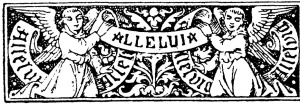“By a tradition handed down from the apostles which took its origin from the very day of Christ’s Resurrection, the Church celebrates the Paschal mystery every seventh day, which day is appropriately called the Lord’s Day, or Sunday.” (Catechism of the Catholic Church 1166/Sacrosanctum Concilium 106) The entire week revolves around Sunday, as the “pre-eminent” day for the Church to come together. Sunday is both the first day of the week, representing the first day of creation, and the eighth day, which represents the eternal day after the Lord’s rest, a new creation, the “day the Lord has made,” which has no end. (See CCC 1166).
Each Sunday is like a “mini-Easter”, celebrating Christ’s Resurrection. Easter is not just one Sunday feast out of the year, but as the Catechism says, is the “Feast of feasts” and the “Solemnity of solemnities.” Each Sunday represents and celebrates the saving work of Christ, his life, death and resurrection for us so that we might have eternal life. That is why participation at Mass each Sunday is an obligation for Catholics (so there are at least 52 days of obligation during the year, not to mention the additional solemnities that are obligatory). We are asked to keep holy the Lord’s Day, just as the early Christians did. It is at the heart of our life in the Church.
One of the most important texts from the Second Vatican Council is Sacrosanctum Concilium, or the “Consitution on the Sacred Liturgy.” This is the document that addresses the Liturgy. It contains a beautiful reflection on Sunday:
“When we ponder, O Christ, the marvels accomplished on this day, the Sunday of your holy resurrection, we say: ‘Blessed is Sunday, for on it began creation…the world’s salvation…the renewal of the human race… On Sunday heaven and earth rejoiced and the whole universe was filled with light. Blessed is Sunday, for on it were opened the gates of paradise…’” (SC 106).
How do you keep the Lord’s Day holy?
